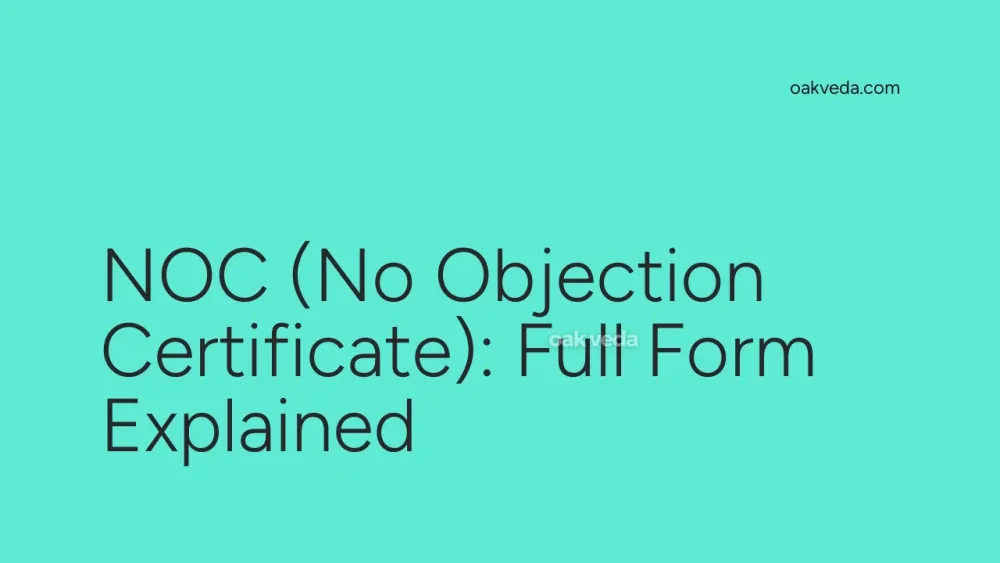
What is the Full Form of NOC?
The full form of NOC is No Objection Certificate. This important document plays a crucial role in various administrative, legal, and business processes across India and many other countries.
What is a No Objection Certificate?
A No Objection Certificate (NOC) is an official document issued by an organization, entity, institute, or individual stating that they have no objection to the particular activity or request mentioned in the certificate. It serves as a formal approval or consent, allowing the recipient to proceed with a specific action or process.
Origin and Development of No Objection Certificate
The concept of NOC has been in use for many decades, particularly in countries with complex bureaucratic systems. In India, NOCs have become an integral part of various governmental and private sector processes. The development of NOCs can be traced back to the need for streamlining administrative procedures and ensuring proper documentation in various fields.
How does a No Objection Certificate work?
A No Objection Certificate works as a formal declaration that the issuing party has no objection to a particular action or request. The process typically involves the following steps:
- Application: The individual or organization in need of the NOC submits a request to the relevant authority.
- Review: The authority reviews the application and assesses whether there are any objections to the proposed action.
- Issuance: If no objections are found, the authority issues the NOC, often with specific terms and conditions.
- Utilization: The recipient can then use the NOC for its intended purpose, such as obtaining permissions or completing legal processes.
Types of No Objection Certificates
NOCs can be issued for various purposes and by different entities. Some common types include:
- Employment NOC: Issued by an employer allowing an employee to seek other job opportunities.
- Property NOC: Issued by housing societies or local authorities for property-related matters.
- Education NOC: Issued by educational institutions for students seeking to transfer or pursue further studies.
- Vehicle NOC: Issued by Regional Transport Offices (RTOs) for vehicle transfers between states.
- Bank NOC: Issued by banks for various financial transactions or loan-related matters.
Functions of No Objection Certificate
The primary functions of a No Objection Certificate include:
- Providing official consent or approval for specific actions
- Facilitating legal and administrative processes
- Preventing potential disputes or conflicts
- Ensuring compliance with regulations and policies
- Serving as a record of authorization for future reference
Applications of No Objection Certificate
NOCs find applications in numerous sectors and situations, including:
- Government departments
- Educational institutions
- Employment and human resources
- Property transactions
- Vehicle registrations and transfers
- Immigration and visa processes
- Financial institutions
- Legal proceedings
Features of No Objection Certificate
A typical No Objection Certificate includes the following features:
- Official letterhead of the issuing authority
- Clear statement of no objection
- Specific details of the action or request being approved
- Name and details of the applicant
- Date of issuance and validity period (if applicable)
- Terms and conditions (if any)
- Signature and stamp of the authorized official
Benefits of No Objection Certificate
The use of NOCs offers several benefits:
- Legal protection: NOCs provide a legal document that can be used in court if necessary.
- Streamlined processes: They help expedite administrative and legal procedures.
- Clarity and transparency: NOCs offer clear documentation of approvals and consents.
- Dispute prevention: By obtaining formal consent, NOCs can help prevent future conflicts.
- Compliance assurance: They ensure that actions are taken with proper authorization and in compliance with regulations.
Limitations or Challenges of No Objection Certificate
While NOCs are valuable, they also come with some limitations:
- Time-consuming: Obtaining an NOC can sometimes be a lengthy process.
- Bureaucratic hurdles: In some cases, excessive red tape can complicate the NOC issuance process.
- Potential for misuse: NOCs might be misused if not properly verified or authenticated.
- Limited validity: Some NOCs have expiration dates, requiring renewal for long-term use.
- Inconsistent formats: The lack of standardization across different authorities can lead to confusion.
Future Developments in No Objection Certificate Technology
The future of NOCs is likely to see technological advancements, including:
- Digital NOCs: Increasing adoption of electronic NOCs for faster processing and verification.
- Blockchain integration: Using blockchain technology to enhance the security and authenticity of NOCs.
- Automated systems: Implementation of AI and machine learning for faster NOC processing and approval.
- Standardization: Development of uniform NOC formats and processes across different sectors and regions.
- Real-time verification: Introduction of systems allowing instant verification of NOC authenticity.
FAQs on NOC Full Form
-
What is the primary purpose of a No Objection Certificate? The primary purpose is to provide formal consent or approval for a specific action or request.
-
Who can issue a No Objection Certificate? NOCs can be issued by various entities, including government departments, educational institutions, employers, banks, and property owners.
-
Is a No Objection Certificate legally binding? Yes, an NOC is a legal document that can be used in court if necessary.
-
How long is a No Objection Certificate valid? The validity period varies depending on the type of NOC and the issuing authority. Some NOCs have a specific expiration date, while others may be valid indefinitely.
-
Can a No Objection Certificate be revoked? Yes, in some cases, an NOC can be revoked by the issuing authority if circumstances change or if the terms of the NOC are violated.
In conclusion, the full form of NOC - No Objection Certificate - represents a crucial document in various administrative and legal processes. As we move towards more digital and streamlined systems, the importance and efficiency of NOCs are likely to increase, making them an even more integral part of our professional and personal lives.
You may be interested in:

